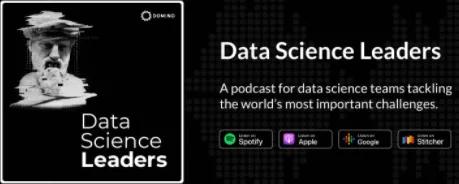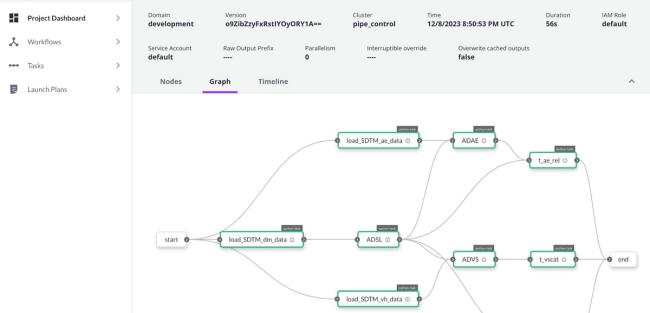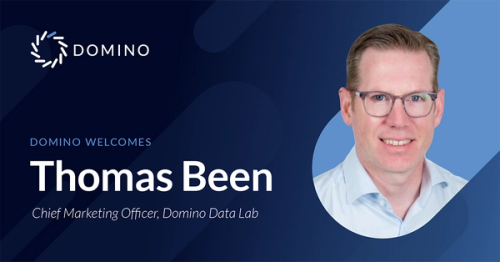‘Data Science Leaders’ Podcast Probes MLOps, Data Ethics, Team Structures and More
Domino Data Lab2021-05-06 | 8 min read

Today we launched ‘Data Science Leaders,’ a new podcast series dedicated to helping teams scale the booming practice of data science by documenting and sharing real stories, breakthrough strategies, and critical insights into building a model of enterprise data science success, from those who have done it.
We recently caught up with the host of ‘Data Science Leaders,’ Dave Cole, to hear what he’s learning, and hopes listeners will learn, in his interviews with leaders whose vast experience has pushed the limits of what data science teams can accomplish.
Why did you start the Data Science Leaders podcast?
Cole: I was once a chief analytics officer, and at the time, I had plenty of experience being on the analytic side and understanding data science as a practitioner. But what I didn’t quite understand is what it meant to be a data science leader. It means understanding things like where your data scientists should be located within your organization; how a data science team can be measured; how the team should interact with business users.
I feel like being a data science leader is a bit of a unique animal, and there’s very little that’s been written about great leaders in this field. There are some very unique aspects of the role which I just wanted to unpack. The goal is to help all those data science leaders out there, as well as aspiring data science leaders, to learn from each other.
This is especially important because there are lots of different ways to succeed in this role, and a lot depends on variables like the industry that you’re in, the type of organization that you’re in, the size of your team, etc. This is why I like the format of talking to various leaders across industries. It’s a format that lends itself to understanding the different approaches that are working for different executives building out high performing teams.
Your first episode features Chris Wiggins, Chief Data Scientist at The New York Times. What sticks out in your mind about that conversation?
Cole: I think it comes as no surprise that, for somebody like the chief data scientist at The New York Times, data ethics is an important issue. But what’s really interesting is that to be aware of —and quite frankly, to define— what it means to be an ethical data scientist is seen as an important duty and aspect of the Times’ data science team. I was fascinated to hear Chris talk about how he approached data ethics, how they wrote down the rules of the road, and even created roles and committees to support a data ethics effort.
Answering data ethics questions is very interesting. I’d like to see more of it across data scientists. It’s a really important topic, especially in light of regulations like the EU’s General Data Protection Regulation or the California Consumer Privacy Act. There’s another guest that I interviewed for this podcast with whom we dove into a bit of data ethics talk around the future of data. While The New York Times may have a unique emphasis on data ethics, it should be something that every data scientist must really think about.
What’s also interesting about Chris’ leadership style are his expectations of his team. You’ll hear him talk on the podcast about how he expects that his data scientists might present to their CEO from time to time. So, they have to be great communicators; they have to be able to answer questions, and translate the work that they’ve done into clear and concise recommendations that a CEO can consume. This is a theme that I’ve seen throughout my conversations: it’s not good enough to understand the code and the stats; you also have to be able to translate it as well.
What have you learned about the current or future state of data science from interviewing these guests?
Cole: First, I learned that data science leaders have some common challenges. For instance, there’s this conversation around whether data scientists should be centralized or embedded into the various business units, or whether there should be some hybrid model. I learned a lot —and we talk a lot— about the pros and cons of that debate.
Also, there is a strong desire amongst data science leaders to articulate data science success, and to measure that beyond just ROI. The consensus is that there’s more to success than how much cost savings we generate from putting this model into production. A leader in data science needs to look at measures such as the right amount of research that a data science team should be doing, or how to source great ideas for projects that can secure funding. Interestingly, these ideas need not always come from your traditional business side. They can come from your data science team itself. It was really interesting for me to learn how various companies accomplish that.
Finally, I was surprised to learn just how focused data science leaders across all industries are on delivering business impact. I learned that there is not one industry that is leading them all. Across the board, there seems to be a common sentiment of data disillusionment across industries, and this drives the leaders I interviewed to ensure that they are putting models at the forefront of their companies’ business. I hope this podcast helps more of them do this well.
Can you tell us about some moments from upcoming episodes that you are excited for the audience to hear?
Cole: I spoke to Fiona Highland, the director of bioinformatics for Thermo-Fisher’s DNA sequencing division, and before that conversation I never really knew what a bio-statistician was or what bioinformatics is. We included a ‘Biology 101’ primer to better understand how some of the basic human DNA concepts get translated into data science, which was a really fascinating conversation. We even segue to talk about the coronavirus and how data science itself was used to create the vaccine; and we lightly touched on the testing, which was a topical and very fascinating conversation.
Also, my talk with author John Thompson was a really exciting one. He’s an author who has written two books —he’s working on a third— around the future of data. We talked about his philosophy on how data should be used, on data privacy and a bit on data ethics as well.
Lastly, I had a really fascinating conversation with Adam McElhinney, Chief Data Science Officer at Paylocity, around people analytics. Every company has an HR department and to hear some of the use cases from him of how data science is being used to try to limit bias in the interview process, fair pay and things of that nature was really interesting.
What questions do you hope to answer in future episodes?
Cole: With each conversation with a new data science leader, I’m seeing that there are different approaches that work for them. While I’d like to think that there are some approaches which are categorically better, I’m finding that there truly are pros and cons to each approach.
I’m coming to the conclusion that a data science leader’s style, and the stage that their data science team is in, can really dictate how they best manage and structure their team. And, that will evolve. So, it would be great to, at some point, step back and talk about the evolution of data science teams as they grow in size and responsibility.
Domino powers model-driven businesses with its leading Enterprise MLOps platform that accelerates the development and deployment of data science work while increasing collaboration and governance. More than 20 percent of the Fortune 100 count on Domino to help scale data science, turning it into a competitive advantage. Founded in 2013, Domino is backed by Sequoia Capital and other leading investors.
RELATED TAGS
Subscribe to the Domino Newsletter
Receive data science tips and tutorials from leading Data Science leaders, right to your inbox.
By submitting this form you agree to receive communications from Domino related to products and services in accordance with Domino's privacy policy and may opt-out at anytime.




